Organic Vs. Synthetic Fertilizers: Which Is Best for Supporting Healthy Pepper Plants?
In the world of supporting healthy pepper plants, the option in between organic and synthetic plant foods stands as a critical choice with significant implications. While both choices objective to give vital nutrients to support plant development, the subtleties of their influence on the dirt, plant health, and the environment spark an argument that mirrors throughout the horticulture neighborhood. Understanding the distinct benefits and possible mistakes of each fertilizer type is crucial for pepper growers looking for to enhance their returns while keeping a sustainable and eco-conscious approach.
Advantages of Organic Fertilizers
Organic fertilizers provide a lasting and environmentally-friendly strategy to beneficial pepper plants, supplying necessary nutrients without using artificial chemicals. These natural fertilizers are originated from natural resources such as compost, manure, bone meal, and algae, advertising soil wellness and biodiversity. Unlike artificial fertilizers, organic options release nutrients gradually, making sure a balanced and steady supply for pepper plants to prosper.
One significant benefit of organic fertilizers is their capacity to improve soil framework and water retention. By improving dirt health, natural fertilizers advertise valuable microbial activity, which helps in nutrient uptake by pepper plants. Furthermore, natural plant foods decrease the danger of chemical run-off, securing water sources from contamination and guarding the environment.
In addition, organic fertilizers add to long-lasting dirt fertility by advertising the development of useful soil microorganisms. These organisms aid break down raw material, launching nutrients in a type that is conveniently obtainable to pepper plants. best fertilizers for peppers. By fostering a healthy and balanced dirt ecological community, natural fertilizers sustain sustainable pepper farming methods that profit both plants and the setting
Disadvantages of Artificial Fertilizers
Artificial plant foods, in comparison to their natural counterparts, present various negative aspects when utilized to nourish pepper plants, impacting both plant health and environmental sustainability. One significant downside of synthetic fertilizers is their tendency to leach nutrients from the dirt promptly. This quick leaching can bring about vitamins and mineral imbalances in the soil, triggering plants to deal with poisonings or deficiencies. Furthermore, synthetic fertilizers can harm advantageous dirt organisms, such as earthworms and beneficial microorganisms, disrupting the dirt environment's equilibrium.
Additionally, the overuse of artificial plant foods can add to water contamination. Excess plant foods not absorbed by plants can get rid of right into water bodies, resulting in eutrophication, where algae blooms diminish oxygen degrees in the water, harming marine life. Synthetic plant foods are usually acquired from non-renewable sources, such as fossil gas, contributing to carbon emissions and environmental degradation throughout their manufacturing.
Nutrient Absorption Comparison
When comparing natural a fantastic read and synthetic plant foods in terms of nutrient absorption, natural plant foods have the benefit of giving a much more well balanced and slow-release source of nutrients. Organic plant foods contain a range of macro and trace elements that are not just valuable for the plants yet also advertise healthy soil microbial activity, which helps in nutrient uptake.
Furthermore, organic fertilizers enhance soil framework and water retention capability, permitting a knockout post pepper plants to gain access to nutrients much more successfully. This enhanced soil quality helps with root development, enabling better nutrient absorption. Synthetic plant foods, although initially boosting plant growth as a result of their high nutrient concentrations, might hinder long-term nutrient absorption by degrading soil wellness over time.
Environmental Impact Factors To Consider

On the other hand, synthetic fertilizers, although usually more promptly available and concentrated to plants, can have destructive effects on the environment if not used appropriately (best fertilizers for peppers). Their production requires high energy inputs, causing greenhouse gas discharges and contributing to environment change. The overflow of excess synthetic plant foods can infect water resources, leading to eutrophication and hurting marine ecosystems.
Ideal Fertilizer Practices for Peppers
To achieve this, it is crucial to comply with best plant food methods tailored to the details needs of pepper plants. One essential technique is to execute a soil test prior to applying any fertilizers.
One more crucial method click here for more info is to fertilize pepper plants at the correct time. Generally, peppers gain from getting plant food at growing and after that once more when they begin to blossom. Over-fertilizing can lead to nutrient discrepancies and hurt the plants, so it is important to comply with suggested application prices.
In addition, picking a well balanced plant food with an NPK ratio that matches pepper plants' requirements is fundamental. Organic fertilizers, such as garden compost or manure, can be outstanding choices as they release nutrients gradually and boost soil structure over time. Artificial fertilizers can give a fast nutrient boost when required. Ultimately, combining artificial and natural plant foods sensibly can help support healthy pepper plants while lessening environmental influence.
Conclusion

Organic plant foods supply an environmentally-friendly and sustainable approach to nourishing pepper plants, providing vital nutrients without the use of synthetic chemicals. Unlike synthetic fertilizers, organic options release nutrients slowly, ensuring a steady and balanced supply for pepper plants to prosper.
Artificial plant foods, in comparison to their natural equivalents, pose various disadvantages when made use of to nourish pepper plants, affecting both plant health and ecological sustainability. When comparing organic and artificial fertilizers in terms of nutrient absorption, organic fertilizers have the benefit of giving an extra balanced and slow-release resource of nutrients.In addition, organic plant foods enhance dirt structure and water retention ability, enabling pepper plants to gain access to nutrients extra successfully.